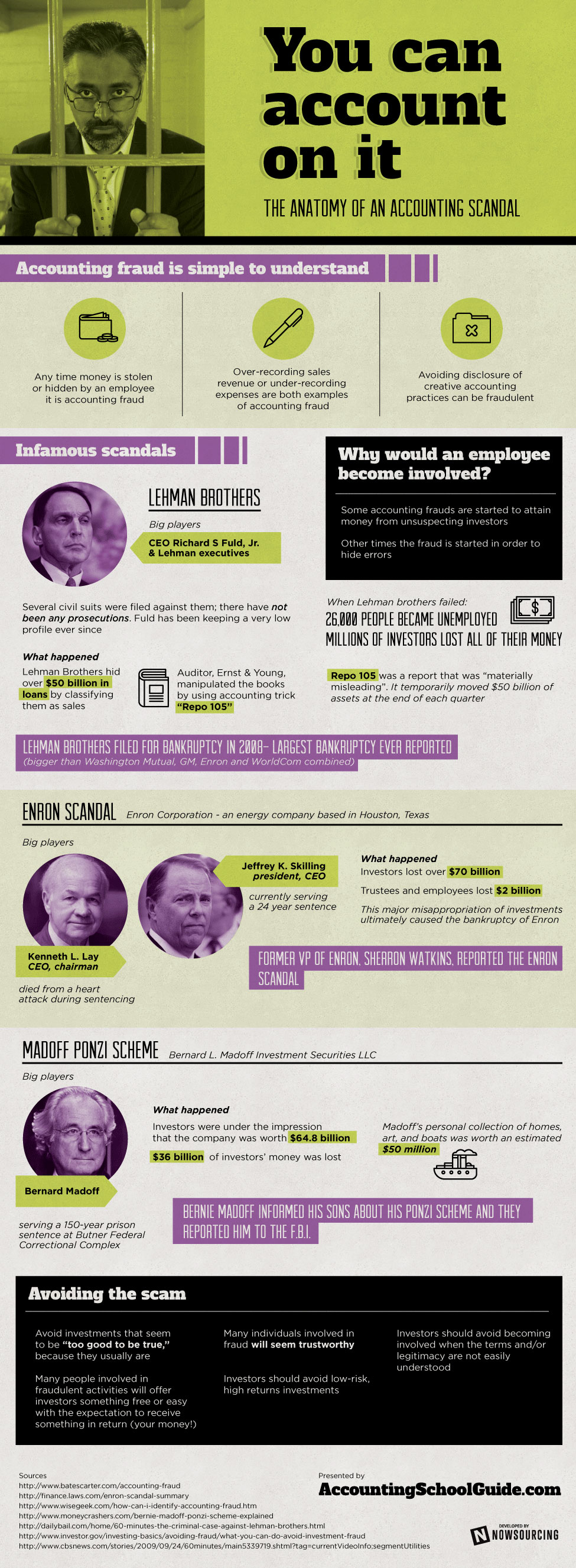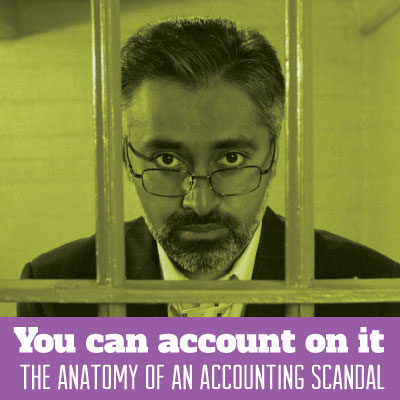Anatomy of an Accounting Scandal
Accounting fraud is simple to understand
- Anytime money is stolen or hidden by an employee it is accounting fraud
- over-recording sales revenue or under-recording expenses are both examples of accounting fraud
- even avoiding disclosure of creative accounting practices can be fraudulent
Why would an employee become involved
- some accounting frauds are started to attain money from unsuspecting investors
- other times the fraud is started in order to hide errors
Infamous scandals
Lehman Brothers
Big players:
CEO Richard S Fuld, Jr. & Lehman executives
Several civil suits were filed against them; there have not been any prosecutions. Fuld has been keeping a very low profile ever since.
What happened
- Lehman Brothers hid over $50b in loans by classifying them as sales
- Auditor, Ernst & Young, manipulated the books by using accounting trick “Repo 105”
- Repo 105 was a report that was “materially misleading”
- it temporarily moved $50b of assets at the end of each quarter
- This made them appear to be far less dependent on borrowed money than they actually were
When Lehman Brothers failed:
- 26 thousands people became unemployed
- millions of investors lost all of their money
The end of the scam
- Lehman Brothers filed for bankruptcy in 2008
- Largest bankruptcy ever reported (bigger than Washington Mutual, GM, Enron and WorldCom combined)
- The entire global economy was affected by the fall of Lehman Brothers
Enron Scandal
Enron Corporation – an energy company based in Houston, Texas
Big players, where are they now:
Kenneth L. Lay – CEO, chairman, died from a heart attack during sentencing
Jeffrey K. Skilling – president, CEO, currently serving a 24 year sentence
What happened
- investors lost over $70 billion
- trustees and employees lost $2 billion
- this major misappropriation of investments ultimately caused the bankruptcy of Enron
The end of a scam
- Former VP of Enron, Sherron Watkins, reported the Enron scandal
Madoff Ponzi Scheme
Bernard L. Madoff Investment Securities LLC
Big players, where are they now:
Bernard Madoff, serving a 150-year prison sentence at Butner Federal Correctional Complex
What happened
- investors were under the impression that the company was worth $64.8 billion dollars
- $36 billion dollars of investors’ money was lost
- Madoff’s personal collection of homes, art, and boats was worth an estimated $50 million dollars
The end of a scam
- Bernie Madoff informed his sons about his ponzi scheme and they reported him to the F.B.I.
Avoiding the scam
- avoid investments that seem to be “too good to be true,” they usually are
- beware of the halo effect
- many individuals involved in fraud will seem trustworthy
- investors should avoid low-risk, high returns investments
- investors should avoid becoming involved when the terms and/or legitimacy are not easily understood
- many people involved in fraudulent activities will offer investors something free or easy with the expectation to receive something in return (your money!)
Sources
- http://www.batescarter.com/accounting-fraud
- http://www.wisegeek.com/how-can-i-identify-accounting-fraud.htm
- http://finance.laws.com/enron-scandal-summary
- http://www.investor.gov/investing-basics/avoiding-fraud/what-you-can-do-avoid-investment-fraud
- http://dailybail.com/home/60-minutes-the-criminal-case-against-lehman-brothers.html


